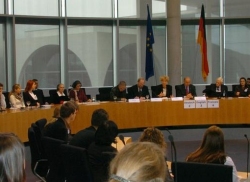Europe in the committees

Many committee discussions of European policy take place in the Europa Room
© DBT
Deliberations on EU items in the Bundestag’s committees
The committees of the German Bundestag stand at the centre of the legislative procedure. This is also true of the involvement of the German parliament in the shaping of EU law. The German Federal Government initially forwards EU items to the Bundestag, including proposals for regulations and directives, decisions of the Commission and the Council, reports and communications submitted by the Commission to the Council and reports issued by the European Parliament (EP). Each item is dealt with primarily by the parliamentary committee responsible, and sometimes by other committees that are also asked for their opinions. Should this be requested, the German Federal Government must brief the committees orally about the EU item and account for its actions.
Protracted deliberations
Since the basis for the deliberations in parliament and its committees constantly changes in the course of the complex, often protracted European legislative procedure, every EU item is something of a “moving target”. It is not unusual for the Bundestag and its committees to discuss and scrutinise a matter several times, beginning with the first transmission of the initial document and ending with the adoption of the legal act in its final form by the Council and the European Parliament.
Taking note or recommending a decision
The deliberations on EU items vary in intensity. Important items are discussed in depth by Members of the German Bundestag in its committees. These discussions are sometimes attended by representatives of the Federal Government competent to speak on the matter in question and occasionally by representatives of the European Commission or Members of the European Parliament. The committees merely take note of the majority of EU items. More rarely, they will submit a substantive recommendation for a decision to the plenary.
EU Committee
The plenary of the German Bundestag then adopts a decision (opinion) – with or without debate – on the basis of the recommendation for a decision delivered by the committee with primary responsibility for the item. The German Federal Government must take this opinion into account when it participates in negotiations in the Council. Alternatively, under certain preconditions, the Committee on the Affairs of the European Union (EU Committee) is able to adopt a decision exercising the rights of the Bundestag (Article 45 Basic Law), which is transmitted directly to the government for its consideration without being discussed in the plenary. Its recommendations for decisions are published with the Committee’s written reports as Bundestag printed papers. The fact that note has been taken of an EU item or a report from the European Parliament is recorded in a note in the minutes of plenary proceedings (stenographic record), which gives no more than the name of the Committee and the number of the EU item.
Guidance for the German Federal Government
The committees sometimes decide not to deliver a written opinion (Article 23[2] Basic Law) and instead merely submit a “summary view” of their discussions to the federal minister responsible. Such a summary view gives a brief account of the course of the debate in the committee without a formal vote having taken place on the item. It does not possess the political validity of a written opinion, but may help the German Federal Government to argue its case in the deliberations with its European negotiating partners.
